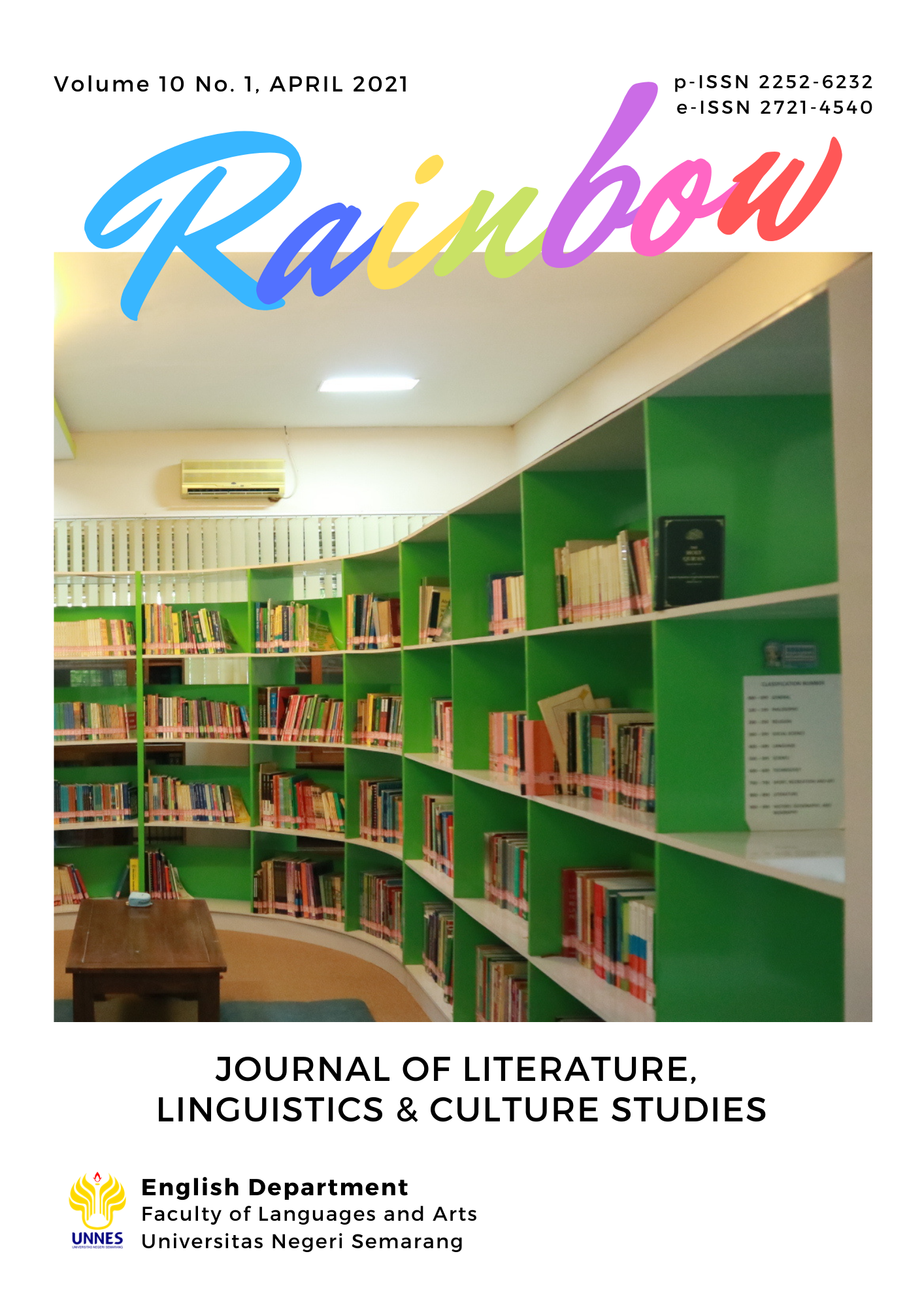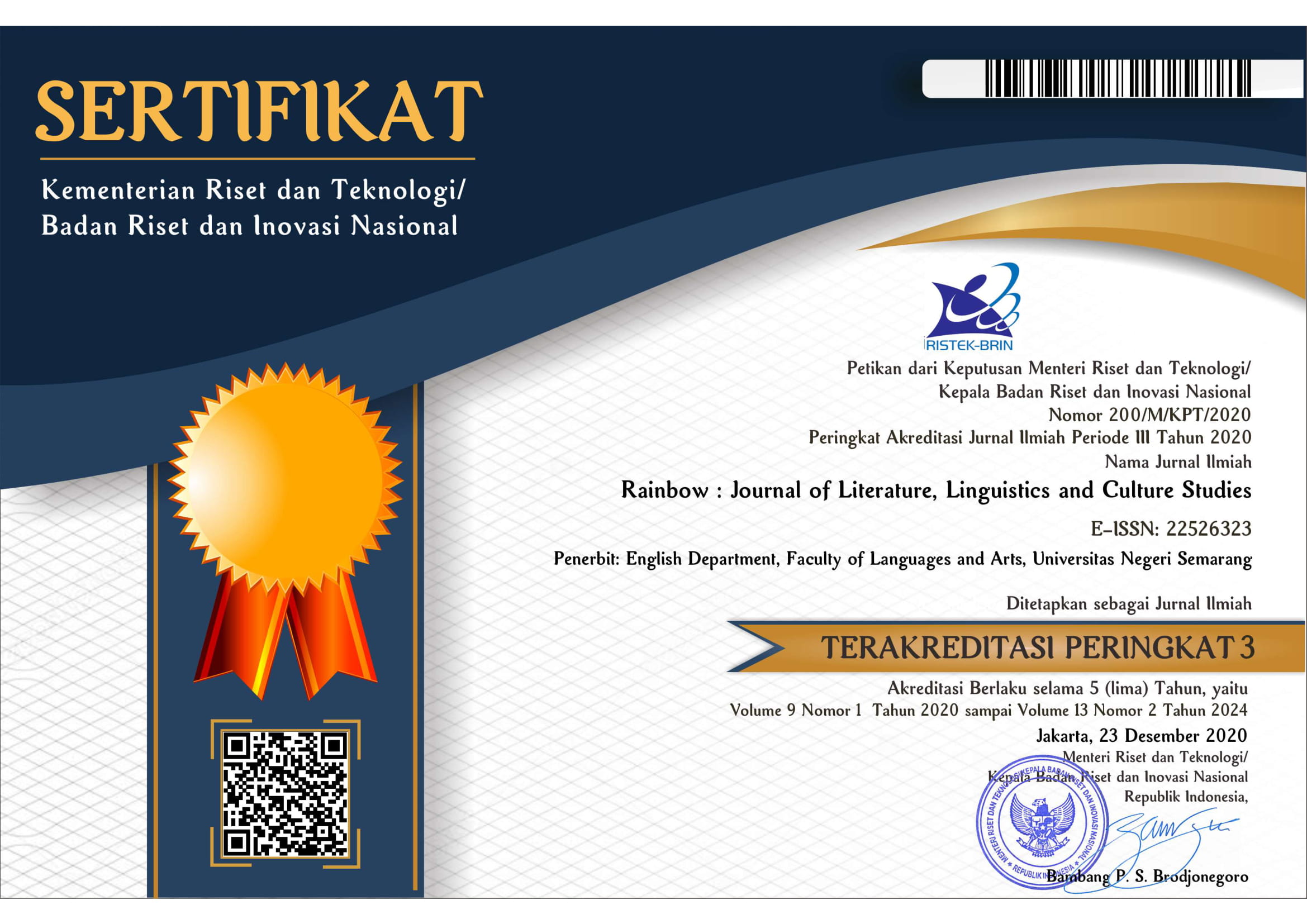The Unstable Nature of Dominant-Subordinate Relation: Postcolonial Study Towards Thomas King’s 'The Colour of Walls'
Abstract
Aboriginal/Indigenous peoples, cultures and works of literature (in the broadest sense) play a crucial role in the continuous growth of world literary and cultural studies. Indigenous writers advocate indigenous rights and address their concerns in works of fiction and non-fiction. Focusing on the correlation between the dominant (center) and the subordinate (margin) in Thomas King’s The Colour of Walls (2013), the present paper aims to specifically investigate the dominant-subordinate interplay in the colonial discourse. So as to elucidate this labyrinthine network of relationships, Homi Bhabha’s critical concept of hybridity is employed throughout the analysis process. The results indicate the unstable nature of dominant-subordinate dichotomy in the story, where power-based relationships are subject to constant change. Accordingly, this process of cultural struggle provides a site for the subordinate to change their marginal position and to resist the dominant’s influence; ultimately, this process assists the subordinate to reclaim their own independent identity.
References
Ashcroft, B., Griffiths, G., & Tiffin, H. (2013). Post-Colonial Studies: The Key Concepts (3rd ed.). Routledge.
Bhabha, H. (1994). The Location of Culture. Routledge.
Brewer, D. (2019). Quotes of Mahatma Gandhi, A Words of Wisdom Collection Book. Lulu.com.
Childs, P., & Williams, P. (1997). An Introduction To Post-Colonial Theory. Routledge.
Chiriboga, Oswaldo Ruiz. (2006). The right to cultural identity of indigenous peoples and national minorities: a look from the Inter-American System. Sur. Revista Internacional de Direitos Humanos, 3(5), 42-69. https://doi.org/10.1590/S1806-64452006000200004
Das, B. K. (2005). Twentieth Century Literary Criticism. Atlantic Publishers & Distributors.
Dennis, H. M. (2007). Native American Literature: Towards a Spatialized Reading. Routledge.
Findlay, L. M. (2000). Foreword. In M. Battiste (Ed.), Reclaiming Indigenous Voice and Vision (pp. ix–xiii). UBC Press.
Gruber, E. (Ed.). (2012). Thomas King: Works and Impact. Camden House.
Hall, S. (2013). Cultural Identity and Diaspora. In P. Williams & L. Chrisman (Eds.), Colonial Discourse and Post-Colonial Theory: A Reader (pp. 392–403). Routledge.
Huddart, David. (2006). Homi Bhabha. Routledge.
Justice, D. H. (2018). Why Indigenous Literatures Matter. Wilfrid Laurier University Press.
King, T. (2013). A Short History of Indians in Canada: Stories. University of Minnesota Press.
Kot, S. (2017). Signs of place in Native American literature: affinity of indigenous space and text. Accents and Paradoxes of Modern Philology, 2(2), 5–18.
Kröller, E. (Ed.). (2004). The Cambridge Companion to Canadian Literature. Cambridge University Press.
Lane, R. J. (2011). The Routledge Concise History of Canadian Literature. Routledge.
Loomba, A. (1998). Colonialism/postcolonialism. Routledge.
---. (2015). Colonialism/Postcolonialism (3rd ed.). Routledge.
Lundquist, S. E. (2004). Native American Literatures: An Introduction. Continuum.
Minh-ha, T. T. (1989). Woman, Native, Other: Writing Postcoloniality and Feminism. Indiana University Press.
Nayar, P. K. (2010). Postcolonialism: A Guide for the Perplexed. Continuum.
---. (2015). The Postcolonial Studies Dictionary. Wiley Blackwell.
Nicolaescu, C. (2015). Multiculturalism in Thomas King’s The Colour of Walls. Journal of Romanian Literary Studies, 7, 93–98.
Ortiz, F. (1995). Cuban Counterpoint, Tobacco and Sugar. Duke University Press.
Runions, E. (2001). Changing Subjects: Gender, Nation and Future in Micah. Sheffield academic Press.
Said, E. W. (2003). Orientalism. Penguin Books.
Shanley, K. W. (2005). James Welch: identity, circumstance, and chance. In J. Porter & K. M. Roemer (Eds.), The Cambridge Companion to Native American Literature (pp. 233–244). Cambridge University Press.
Yazzie, R. (2000). Indigenous Peoples and Postcolonial Colonialism. In M. Battiste (Ed.), Reclaiming Indigenous Voice and Vision (pp. 39–49). UBC Press.
Young, R. J. C. (1995). Colonial Desire: Hybridity in Theory, Culture and Race. Routledge.







